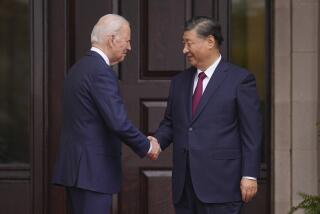Obama’s meeting with Dalai Lama hews to protocol -- though not in China’s eyes
- Share via
Reporting from Washington — President Obama and the Dalai Lama held a relaxed, unhurried conversation Thursday, reiterating long-standing commitments to seek greater rights for people living in the Tibetan regions of China.
After the hourlong meeting, the Tibetan spiritual leader emerged from the White House, smiling and playfully tossing a handful of snow at reporters before heading to a meeting with Secretary of State Hillary Rodham Clinton.
Although the White House worked to keep the meeting low-key, Beijing objected to what it saw as U.S. support for an exiled monk who advocates Tibet’s independence from China. The 74-year-old Buddhist leader’s visit came days after a $6-billion U.S. arms deal with Taiwan that was also opposed by Beijing, which considers Taiwan part of China.
In Beijing, Foreign Ministry spokesman Ma Zhaoxu said in a statement that “the U.S. act grossly violated the norms” governing international relations.
The Dalai Lama praised the U.S. as “a champion of democracy, freedom, human value and human creativity.” He said he thanked Obama for the president’s past expressions of concern for the Tibetan people.
“Even before he became president, during the election, he telephoned me,” the Dalai Lama told reporters after the meeting. “And then after he became president, he was also showing his genuine concern, including [during] his recent visit to Beijing. You see, he expressed his concern about Tibet.”
After Obama’s trip to China last fall, some liberals and human rights advocates criticized his decision to delay a meeting with the Dalai Lama until after sitting down with Chinese leader Hu Jintao. They feared Obama was going too far to avoid offending the Chinese.
But aides to Obama said they had talked over the decision with the Dalai Lama in advance of the China trip and that the spiritual leader agreed with the rationale for meeting first with Hu.
After Thursday’s meeting, senior administration officials said the president expressed his support for the preservation of Tibetan culture as part of China, in keeping with U.S. policy.
In their meetings with the Dalai Lama, recent U.S. presidents have gone out of their way to officially acknowledge China’s sovereignty in the region.
Obama followed suit, commending the Dalai Lama’s commitment to nonviolence and his pursuit of dialogue with the Chinese government.
In keeping with the three presidents who preceded him, Obama didn’t meet with the Dalai Lama in the Oval Office, a symbol of American power that China reportedly considers especially offensive for such a meeting. Instead they met in the Map Room.
Beijing is likely to react more harshly to this meeting than it has to past U.S. visits by the Dalai Lama, said Liu Jiangyong, a professor at the Institute of International Studies at Tsinghua University in Beijing. Tensions already are high because of the U.S.-Taiwan arms deal, and Tibet has become a more sensitive issue because of violence there and in the Xinjiang region of China’s far west.
“This meeting will have a very negative impact on Sino-U.S. relations,” Liu said. “It drives at China’s internal affairs and hurts China’s sovereignty. People should expect a strong reaction” from Beijing.
U.S. officials have described the relationship between the countries as too broad to be derailed by a single dispute.
But Liu disagrees, saying Tibet, like Taiwan, is a central Chinese issue that has the potential to damage cooperation on other diplomatic fronts.
Times staff writer David Pierson in Beijing contributed to this report.
More to Read
Sign up for Essential California
The most important California stories and recommendations in your inbox every morning.
You may occasionally receive promotional content from the Los Angeles Times.














